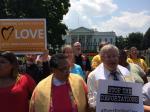The Nile could not be managed by independent satrapies
In his book, Cannibals and Kings, anthropologist Marvin Harris explains the difference in the development of nation-state governments in the "hydraulic kingdoms" of the Middle East and the "rainfall economies" of northern Europe.
In both cases the issue affecting formation of government was water and the creation of wealth. These were agricultural economies, with agricultural production being the foundation of all wealth. In the Middle East, water meant rivers since there was little rainfall, and management of rivers required a strong central-planning agency.In the case of Egypt's Nile, that led to an all-powerful pharoahite government, a pattern mostly duplicated elsewhere in the ancient Middle East. Therefore, wealth became concentrated in the central government because the rulers controlled the means of production and the water resources production required.
In northern Europe, rivers were hardly necessary to agriculture because of reliable, year-round precipitation. Because wealth creation was therefore dispersed, so was political power. Nowhere in the hydraulic kingdoms was there the equivalent of European systems of kings, dukes, barons, counts or marquis, all of whom did not depend on the king or the king's government to till the land and grow its wealth. They therefore had the means to resist the near-total centralization of power found in the Middle East. When such centralization did occur, it was an aberration and short-lived.
When the means to create wealth is dispersed, political power is dispersed along with it. Wealth gains political power, but political power is not needed just to create wealth. In the Middle East, however, wealth came from political power because there was no means to create wealth of significance apart of political power. So for centuries, nay millennia, the way to become wealthy there was first to gain political power.
This pattern survives to this day. Saddam Hussein, for example, was a nobody of limited material means until he literally murdered his way into power in Iraq in 1979. It was after gaining control of Iraq's government that Saddam became wealthy beyond all avarice.
Now the point of this little history lesson is this: In the United States, the means to create wealth and the exercise of political power in public office are being steadily unified. We are already well along to adopting a Middle East model. Since the Obama administration came into being, the wealthiest counties of America and the most politically-powerful counties of America have for the first tome become the one and same - all concentrated in and around Washington, D.C. Through minute regulation of economic activity, America's political class is deliberately suppressing wealth creation over the broad expanse of the country, while funneling tax dollars to favored cronies. Remember, for example, Solyndra?
At the same time, the political figures are using their offices to gain personal wealth. Consider Senator Harry Reid, the majority leader and hence one of the most powerful figures in Washington. He was born into poverty, growing up in a home that had no running hot water or indoor toilet. His first job in D.C. was working the night shift as one of the Capitol Hill Police. Yet after entering national office, his personal wealth has arisen to as much as $10 million.
But what sent me into writing this post was today's report that the champion rent seekers of all time, Bill and Hillary Clinton, "turned the State Department into a racket to line their own pockets" while she was secretary of state.
“These documents are a bombshell and show how the Clintons turned the State Department into a racket to line their own pockets,” said Judicial Watch President Tom Fitton. Judicial Watch and the Washington Examiner teamed to seek and publish those documents today. “How the Obama State Department waived hundreds of ethical conflicts that allowed the Clintons and their businesses to accept money from foreign entities and corporations seeking influence boggles the mind,” said Fitton, adding, “That former President Clinton trotted the globe collecting huge speaking fees while his wife presided over U.S. foreign policy is an outrage." The Examiner reported that the former president gave 215 speeches and earned $48 million while Hillary Clinton was at State.Welcome to the potentate kingdom of the United States.
Update, Dec. 2017: And the beat goes on: "Census Bureau: 5 Richest Counties Are D.C. Suburbs"


